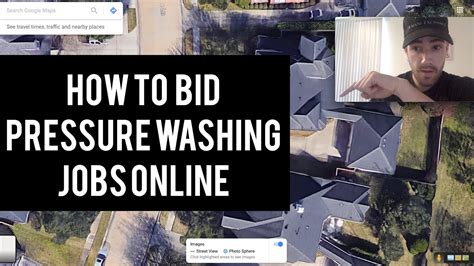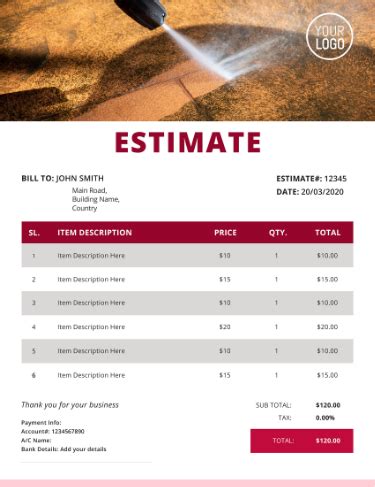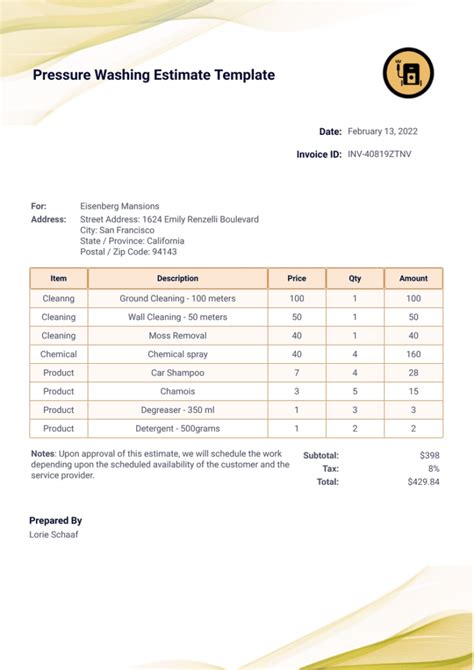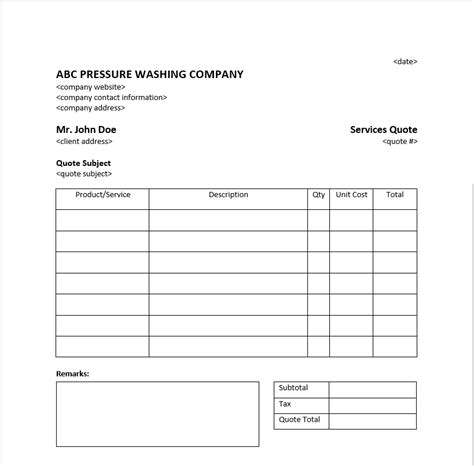How To Bid A Pressure Washing Job

Pressure washing is a lucrative business, offering a wide range of services from residential cleaning to industrial pressure washing. To bid on a pressure washing job effectively, you need a systematic approach that considers various factors, from the scope of work to the necessary equipment and potential challenges. This guide will walk you through the process, providing you with the tools to create accurate and competitive bids that win contracts and build your business.
Step 1: Understand the Scope of Work

Before you can bid on a pressure washing job, you must thoroughly understand the scope of work. This includes:
- Surface Area: Calculate the total area that needs to be pressure washed. For residential jobs, this could be the size of a driveway, patio, or siding. For commercial or industrial jobs, it could be the exterior of a building, parking lot, or equipment.
- Surface Type: Different surfaces require different pressure washing techniques and equipment. Common surfaces include concrete, asphalt, brick, wood, vinyl, and metal. Each surface may have unique challenges, such as delicate finishes or embedded stains.
- Degree of Difficulty: Assess the complexity of the job. Some jobs may be straightforward, while others may involve hard-to-reach areas, intricate detailing, or the need for specialized techniques, such as soft washing.
- Additional Services: Beyond pressure washing, the client may require other services like gutter cleaning, window washing, or sealing. Ensure you understand all the services requested and quote them accurately.
A clear understanding of the scope of work is crucial for accurate bidding. It helps you determine the time and resources required, and it ensures you can provide a detailed and transparent quote to the client.
Step 2: Estimate the Time and Resources Needed

Once you have a grasp of the scope, you can estimate the time and resources necessary to complete the job.
- Time Estimate: Based on your experience and the specific job requirements, estimate the number of hours it will take to complete the pressure washing. Consider factors like the size of the area, the surface type, and any additional services.
- Equipment and Supplies: Make a list of the equipment and supplies you will need. This could include pressure washers of various sizes and power levels, cleaning solutions, protective gear, and any specialized tools for specific surfaces or tasks.
- Labor Costs: Calculate the labor costs by multiplying the estimated hours by your hourly rate. Consider the skill level and number of workers required for the job.
- Overhead and Operating Costs: Don't forget to include overhead costs, such as insurance, vehicle maintenance, and office expenses. These costs should be allocated fairly across all jobs to ensure your business remains profitable.
A detailed time and resource estimate ensures you can price the job competitively while still covering all your expenses and maintaining a reasonable profit margin.
Step 3: Calculate Material and Equipment Costs
Pressure washing jobs often require a variety of materials and equipment. Calculate these costs accurately to ensure your bid is profitable.
- Pressure Washers: Consider the cost of renting or purchasing pressure washers for the job. This includes the initial cost and any associated maintenance or fuel costs.
- Cleaning Solutions: Determine the type and quantity of cleaning solutions needed. Some jobs may require specialized solutions for specific stains or surfaces.
- Safety Gear: Pressure washing can be a hazardous job, so ensure you have the necessary safety gear, including protective clothing, eye and ear protection, and respirators.
- Additional Tools: Depending on the job, you may need ladders, extension poles, or other tools to reach all areas effectively.
Accurate calculation of material and equipment costs is essential to avoid underestimating expenses and ending up with a loss-making job.
Step 4: Consider Potential Challenges and Additional Costs
Every pressure washing job comes with its unique set of challenges. Consider these potential issues and their associated costs when bidding:
- Weather Conditions: Inclement weather can delay or disrupt pressure washing jobs. If the job has a tight timeline, consider the cost of rescheduling or using weather-appropriate equipment.
- Travel and Transportation: Calculate the time and cost of traveling to the job site, especially if it's far from your base. Consider the fuel costs and any tolls or parking fees.
- Permits and Licenses: Some jobs may require specific permits or licenses, especially for commercial or industrial projects. Research and include these costs in your bid.
- Specialized Services: If the job requires specialized services, such as soft washing or concrete sealing, ensure you have the necessary training and equipment. Factor in the cost of any additional training or certifications.
By accounting for potential challenges and their associated costs, you can ensure your bid is realistic and covers all eventualities.
Step 5: Create a Competitive Bid

With all the necessary information at hand, it’s time to create your bid. A competitive bid should be:
- Accurate: Based on your detailed estimates, create a bid that covers all your costs and includes a reasonable profit margin.
- Transparent: Provide a clear breakdown of the costs to the client. This builds trust and allows the client to understand the value they're receiving.
- Competitive: Research the market rates for similar pressure washing jobs. Ensure your bid is competitive while still being profitable.
- Flexible: Consider offering package deals or discounts for larger jobs or repeat customers. This can make your bid more attractive and help you stand out from the competition.
A well-crafted bid demonstrates your expertise and value as a pressure washing professional. It shows the client that you understand their needs and can deliver a high-quality service at a fair price.
Step 6: Follow Up and Close the Deal
Once you’ve submitted your bid, follow up with the client to ensure they received it and to answer any questions they may have. Be prepared to negotiate and adjust your bid if necessary, but always maintain your integrity and ensure your business remains profitable.
Closing the deal is just the beginning. Once you've won the contract, ensure you deliver exceptional service to build a strong relationship with the client and encourage repeat business and positive reviews.
Conclusion
Bidding on pressure washing jobs requires a systematic approach that considers the scope of work, time and resources, material costs, potential challenges, and competitive market rates. By following these steps and continuously refining your bidding process, you can win more contracts, grow your business, and establish yourself as a trusted and reliable pressure washing professional.
FAQs
How do I price my pressure washing services competitively without undercutting my profits?
+Pricing competitively involves understanding your costs and the market. Calculate your overhead, labor, and material costs accurately. Then, research local market rates for similar jobs. You can offer discounts or package deals to attract customers, but ensure your pricing still covers your expenses and provides a reasonable profit.
What if I encounter unexpected challenges during the job that weren’t included in my bid?
+Unexpected challenges are part of the business. If you encounter issues that significantly impact your bid, communicate with the client. Explain the situation and negotiate a potential adjustment to the contract. Being transparent and finding a mutually beneficial solution is key.
How can I ensure my bid stands out from competitors and wins more contracts?
+To make your bid stand out, focus on providing a detailed, transparent quote. Include a breakdown of costs and a clear timeline. Showcase your expertise and experience by highlighting relevant projects you’ve completed successfully. Offer additional services or warranties that add value to your bid.
Are there any common mistakes to avoid when bidding on pressure washing jobs?
+Yes, some common mistakes to avoid include underestimating the time required, overlooking hidden costs like travel or specialized equipment, and not accounting for potential challenges like weather delays. Always ensure your bid is thorough, accurate, and allows for a reasonable profit.



